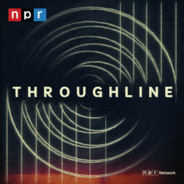
Kultur & Gesellschaft
Throughline Folgen
Throughline is a time machine. Each episode, we travel beyond the headlines to answer the question, "How did we get here?" We use sound and stories to bring history to life and put you into the middle of it. From ancient civilizations to forgotten figures, we take you directly to the moments that shaped our world. Throughline is hosted by Peabody Award-winning journalists Rund Abdelfatah and Ramtin Arablouei.Subscribe to Throughline+. You'll be supporting the history-reframing, perspective-shifting, time-warping stories you can't get enough of - and you'll unlock access bonus episodes and sponsor-free listening. Learn more at plus.npr.org/throughline
Folgen von Throughline
-
Folge vom 16.02.2023Throughline Presents: White LiesIt all started with a photograph. A photograph from 1991 of a prison takeover in rural Alabama. A photograph of a group of men on the roof of that prison holding a bedsheet scrawled with a message: "Pray for us." In the first episode of the new season of White Lies, hosts Chip Brantley and Andrew Beck Grace go searching for answers to the questions raised by this photograph. Who were these men? What on earth had made them want to take over that prison? And what became of them after? As they search, they uncover a sprawling story: a mass exodus across the sea, a secret list, and the betrayal at the heart of this country's ideals. This week, we're bringing you an episode of White Lies, a series by NPR's documentary podcast Embedded, which unearths the stories behind the headlines.Learn more about sponsor message choices: podcastchoices.com/adchoicesNPR Privacy Policy
-
Folge vom 09.02.2023The Whiteness MythIn 1923, an Indian American man named Bhagat Singh Thind argued before the U.S. Supreme Court that he was a white man and was therefore eligible to become a naturalized citizen. He based his claim on the fact that he was a member of India's highest caste and identified as an Aryan and therefore white. His claims were supported by the so-called Indo-European language theory, a controversial idea at the time that says nearly half the world's population speak a language that originated in one place. Theories about who lived in that place inspired a racist ideology that contended that the original speakers of the language were a white supreme race that colonized Europe and Asia thousands of years ago. This was used by many to define whiteness and eventually led to one of the most horrific events in history. On this episode of Throughline, we unpack the myths around this powerful idea and explore the politics and promise of the mother tongue.Learn more about sponsor message choices: podcastchoices.com/adchoicesNPR Privacy Policy
-
Folge vom 02.02.2023The Real Black Panthers (2021)In 1968, FBI Director J. Edgar Hoover said the Black Panther Party "without question, represents the greatest threat to the internal security of the country." And with that declaration he used United States federal law enforcement to wage war on the group. But why did Hoover's FBI target the Black Panther Party more severely than any other Black power organization? Historian Donna Murch says the answer lies in the Panthers' political agenda: not their brash, gun-toting public image, but in their capacity to organize across racial and class lines. It was a strategy that challenged the very foundations of American society. And it was working.Learn more about sponsor message choices: podcastchoices.com/adchoicesNPR Privacy Policy
-
Folge vom 26.01.2023When Things Fall ApartClimate change, political unrest, random violence - Western society can often feel like what the filmmaker Werner Herzog calls, "a thin layer of ice on top of an ocean of chaos and darkness." In the United States, polls indicate that many people believe that law and order is the only thing protecting us from the savagery of our neighbors, that the fundamental nature of humanity is competition and struggle. This idea is often called "veneer theory." But is this idea rooted in historical reality? Is this actually what happens when societies face disasters? Are we always on the cusp of brutality?Learn more about sponsor message choices: podcastchoices.com/adchoicesNPR Privacy Policy
